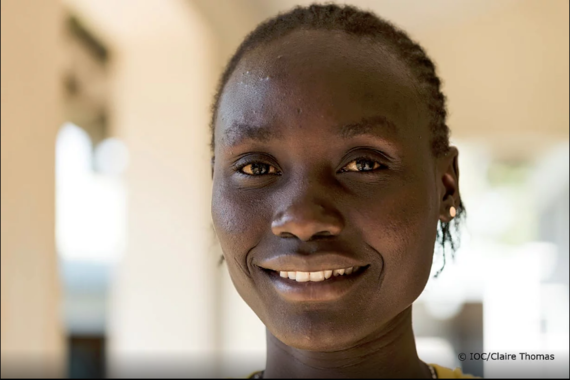Co-written by Roger Thurow
When Anjelina Nadai Lohalith first began running as a little girl, it was an early morning sprint through the bush of what is now South Sudan to milk her family's cows - one of the few sources of nourishment she could count on. At the age of six, she was on the run to escape the tribal violence that destroyed her village and left her perpetually chasing any scrap of food. Eventually, Anjelina arrived at the Kakuma refugee camp in neighboring Kenya, where the United Nations' World Food Programme (WFP) was providing lifesaving meals at the makeshift school. Finally, properly fortified, she began running for fun, racing in competition with her classmates.
Now, Anjelina is running as an Olympian, a member of the first-ever refugee team, at the Rio Games. The reliable nutrition she received while growing up at the Kakuma camp, she says, made it possible. "Without it, we wouldn't have survived," she told WFP staffer Katherine Arms ahead of her trip to Brazil. "Compared to what we had, Kakuma saved us. We received a steady flow of food at the time and we could rely on it."
The school meals she received not only fueled her growth and education, it also fed her dreams of becoming an elite athlete and returning to her home country one day. "Food in school encourages kids at home to go (to school) and it also encourages kids to compete at a higher level," she says.
Anjelina's journey illustrates the power of nutrition to unlock human potential. Good Proper nutrition enables minds and bodies to grow and develop and, in time, shapes the future of families, communities and the entire planet. It is life's most basic building block.
Yet one in four children worldwide will never realize their potential, Olympic or otherwise, as a result of chronic hunger and malnutrition. Malnutrition as a child--especially during the first 1,000 days, from the beginning of a mother's pregnancy to her child's second birthday--is a life sentence of underachievement and underperformance. Proper nourishment during this crucial window of time can mean the difference between a promising future or one plagued by poor health and stunted growth. Roughly half of all child deaths can be attributed to malnutrition, with 3.1 million young children dying every year from related causes. Another nearly 200 million are chronically malnourished and suffer from serious, often irreversible, physical and cognitive stunting. They don't even get out of the starting block.
Just a small investment in maternal and child nutrition can have a huge return. Research has shown that every dollar invested in proper nutrition for mothers and children can save up to $166 in health care costs and lost productivity and wages over time. Improving child nutrition can even improve a country's GDP. In Africa and Asia, for example, studies have shown that governments can boost their GDP by as much as 11 percent annually when they invest in nutrition outreach and programs targeted at mothers and children during that crucial 1,000-day window.
We know what it takes to end child malnutrition: Education, sanitation and access to the right foods at the right time isn't a mystery. Through the global Scaling Up Nutrition (SUN) movement, more than 50 countries have pledged to make nutrition for mothers and children a top priority. But unprecedented humanitarian crises across the globe threaten to unravel the progress made so far. World leaders must redouble their efforts so the most vulnerable children are not left behind.
That was the call that went forth from Rio on the eve of the world's ultimate celebration of human physical achievement. Governments, philanthropies, humanitarian organizations, and athletes gathered at a Nutrition for Growth conference to demand an increase in nutrition investments, particularly in the first 1,000 days, so all children could get off to a fair start. "As an athlete who did not have good nutrition, I had a challenge," said legendary Kenyan marathoner Tegla Loroupe, who trained several members of the refugee team, including Anjelina.
Indeed, while Anjelina runs in Rio, back in her home country of South Sudan child malnutrition rates are soaring as deadly fighting continues to disrupt agricultural production and send millions of families fleeing for safety. Last week, the Washington Post reported that some mothers are so malnourished they can no longer breastfeed their babies.
Just imagine how many future Olympians--not to mention artists, inventors and leaders--the world is losing to malnutrition and chronic hunger. What wonders and joys are we missing, what benefits to all of humanity are being squandered? Clearly, a lost chance at greatness for one child is a lost chance for all of us.
Rick Leach is the President and CEO of World Food Program USA, a non-profit organization based in Washington, D.C., that supports the mission of the U.N. World Food Programme, the largest hunger relief agency in the world.
Roger Thurow is a senior fellow at The Chicago Council on Global Affairs and author of "The First 1,000 Days: A Crucial Time for Mothers and Children - And the World."

